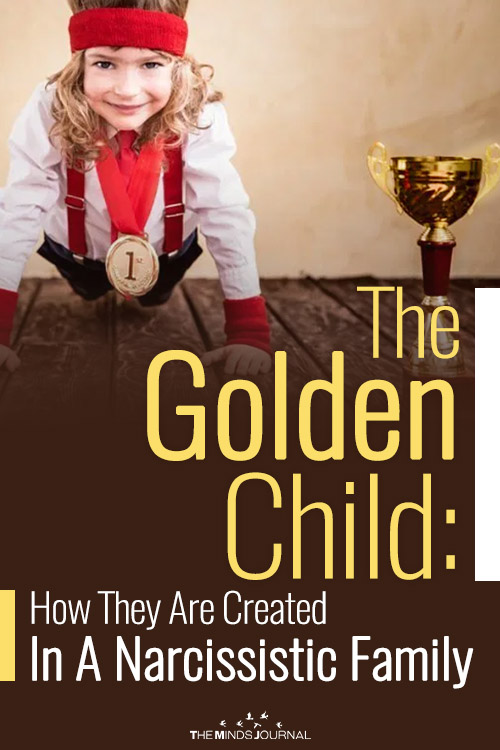The Golden Child: Before going into the details of the concept of golden child syndrome, know that every parent dreams of a golden child until they know the making of one.
Parents want their children to get access to the best resources possible and they toil hard to provide them with the necessary education, shelter, food, and comfort. To say the least, parents have in mind the best interest of their children.
But in a family where either of the parents shows narcissistic traits or is clinically diagnosed with a Narcissistic Personality Disorder, the dynamics vary greatly.
In a healthy family structure, the parents are self-assured and provide their children with a warm and productive environment to ensure their overall development.
Such parents know how to balance the need to exercise control over their children and procure autonomy. Healthy parents rely on transparency, empathy, and understanding to grow a secure attachment with their children. They do not depend on criticism, body shaming, guilt-tripping and other dark manipulative techniques to create broken, insecure, self-effacing, and anxious children.
Narcissistic parents have no sense of self and they live their entire life behind the facade of a pretentious self. This self requires constant feeding to sustain. A family where either or both of the parents are narcissists, the child becomes a mere source of narcissistic supply to keep the fake self, surviving.
What is supposed to be nurturing and containing structure to build a healthy child turns into a drama in which the child plays the role of rescuer and sacrifices his own sense of self to cater to his/her parent/s’ fake self.
The parent/s’ boundaries are diffuse with that of their child and the child never acquires a completely individualistic sense of self and this is how the golden child is made.
Read 5 Behaviours You Display Because You Were Raised By A Narcissist
The golden child is fundamentally an extension of the narcissist parent.
Hence, he or she is the embodiment of perfection, the ‘good child’, the ‘special child’ who is a projection of all the impeccable characteristics of the parent and hence should strive regularly to inculcate and facilitate those qualities of a virtuous person, the ones their parent/s portray.
A golden child cannot shake off the feeling that he/she is special but is unable to find within oneself the grounds on why it should be so. There is an underlying longing to be accepted as they are, with their imperfections and frailties, rather than being praised for the glossed person which they are not.
Now that you know how a golden child in a narcissistic family comes into being, let’s look at some of the traits of a golden child:
6 characteristics of a golden child in a Narcissistic Family:
1. He/she is competitive:
As earlier mentioned, a golden child is a reflection of their narcissistic parent. This child is very competitive in nature, always striving to win. In a narcissistic family, the children are pitted against one another to encourage competition. So this golden child grows up very competitive in nature.
They often take personal risks to ensure they secure the first position, in all aspects of life. Their self-confidence and sense of self-esteem are based on external sources of reinforcement, like achievements, praises, and titles. This takes me to the second characteristic which is…
Read How To Save Children From Narcissistic Abuse and Toxicity
2. He/she is studious
Which kid loves studying? None other than the golden child in a narcissistic family. Unlike other kids, he or she is extremely excited about going to school and taking part in competitive events that they love.
School is their best place to be. In fact, going to school, for them, is the most fun part of the day. They thrive the best in competitive situations. They are bold and upfront in handling the competition.
No doubt, they are the celebrated star of the class. Never failing to secure a place in the good books of the teacher because they shine. They literally set a milestone for their fellow-students. They would rather teach his/her friends a few intellectual topics than needing help in their homework.
3. He/She abides by parents’ rules
One can find most children being rebellious on being dictated and controlled. But to a golden child, the rules set by their parents is the ultimate rule book for them.
They never question their parents’ decisions. They even end up sacrificing their choices to take up the choices of their parents.
4. He/she has productive hobbies
Video games and television shows are not the golden child’s cup of tea.
They prefer engaging themselves in truly inspiring and fruitful hobbies which provides them the chance to improve themselves.
They find better investments of time in reading books, getting down to involve in sports, playing an instrument, painting or doing creative activities.
Read 13 Common Traits Of An Indigo Child
5. He/She is sociable
This child is the talker, the attention grabber of the lot. They are the center of attention in a house party. All the other children in their friend circle look up to him/her.
They are often armed with good communication skills and convincing capabilities while themselves being non-credulous. They also have a natural knack for sports and outdoor games.
6. He/she is sensitive to criticism
This child knows that he/she is exclusive. They know that they are not like the rest of the other children. Often times, they hold themselves at a higher pedestal than they could be accredited to.
Being hypersensitive to criticism, they do not like getting slagged for whatever they say or do.
Read How A Child Becomes Narcissistic: What Type of Parenting Leads Children To Grow Up With NPD?
7. He/she seeks perfection
Ever since a very young age, this child has a tendency to be obsessed with perfection. They want their dress all clean and tidy, food just like they want it, their rooms organized and in order and their homework should be free of mistakes.
They frustrate themselves when they fail to live up to their own unrealistic expectations.
Oh boy! The description looks clean. Who doesn’t want to be a golden child? And if you are an expecting mother, yes, this is how you want your kid to be – full of virtues.
But many fail to see the fragile personality in making, behind the mask of aura and glamour. Everything they touch is gold (hence the name) until they grow up and their world crumbles into a ruin of disorientation.
A golden child will seldom develop psychologically and emotionally to individuate. This means, these children on growing up struggle to find an identity for themselves. On growing up, this child will almost be disabled to take care of oneself, to make one’s own decision.
A golden child who has undergone narcissistic parenting might have these following psycho-emotional problems when they grow up:
- Hypervigilance and obsessive traits
- Being hypersensitive to criticism
- Paranoia
- Falling to respect and understand the importance of boundaries in a relationship with others and self
- Might become a people pleaser
- Poor decision-making skills
- Poor judgmental skills
- Attention seeking behavior
- Difficulties in dealing with hurdles and daily hassles
- As opposed to being emotionally sensitive, they might become detached and fail to make meaningful connections
- Might resort to manipulative techniques while dealing with people
- Poor ability to tolerate uncertainty and frustrations.
- They might grow up to have narcissistic traits.
The above-mentioned truths portray the costly side effect of favoritism. Pretty much every family has a golden child and it not only impacts the child but also anyone who is closely associated with him/her, especially his/her siblings.
As a parent, the least you can do is never forget to allow your child to exercise the autonym they deserve. These words by Erik Erikson is for you to read and imbibe in yourself as a parent:
Parents must not only have certain ways of guiding by prohibition and permission, but they must also be able to represent to the child a deep, almost somatic conviction that there is meaning in what they are doing.
– Erik Erikson











Leave a Reply